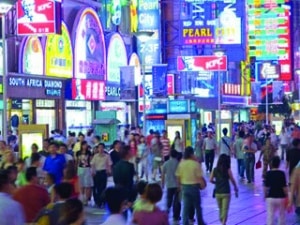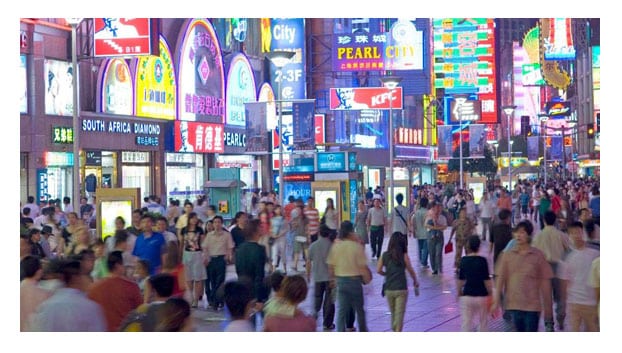
Every time my plane lands in Beijing Capital International Airport, my anticipation of returning to my home country is replaced by a nervousness about how to practically navigate a country that I have not visited for a year.
First, I realize that I cannot text or call my family or friends about my arrival, because I do not have a Chinese SIM card. I try to connect to the free WiFi at the Beijing airport, but doing so requires verifying a Chinese phone number, which I don’t have.
Because my phone can only be used with an AT&T SIM card, I would have to use a portable WiFi router, which is what I usually do when traveling overseas. I look for one of those portable WiFi rental booths—easily available in other countries’ airports I’ve been to—and was told that they don’t exist at the Beijing airport. I would have to visit one of the China Mobile offices in the city.
Next, I needed to get to where I’m staying, and realized that I could not open Baidu Maps without the Internet. Feeling like a tourist, I asked an attendant at the Information booth about how to get to a particular subway stop. I tried to call a Didi or Uber, but realized I would not be able to communicate with the driver because I didn’t have a Chinese phone number. So I took the train.

After I got to the apartment, I tried to look for a China Mobile office near me, and did what every American coddled by Google Maps would do: I searched for “China Mobile” in Baidu Maps. It showed that the nearest office is 1km away from me. However, when I asked a security guard just to be sure, I was told that there was one less than 100m from where I live. Lesson learned: many places in China are simply not on the maps.
It turned out the closest China Mobile office was too small and did not have the portable WiFi plan I was looking for. So I trekked to another one, which did not have it either. Only at my third attempt did I successfully buy a portable WiFi plan, which finally ended my incommunicado status. (This was a sharp contrast to my experience in Tokyo, Hong Kong, and Paris, where the airport’s arrival hall had multiple booths for portable WiFi rentals designed for tourists.) Once I became connected, I received a deluge of notifications on Gmail and Facebook, only to realize I cannot open them thanks to the Great Firewall.
As I walk the streets in Beijing, I make several notes to myself: Do not take the traffic lights too seriously; only walk when you can be sure that no car will run over you. Do not expect cars to stop for pedestrians like they do in Cambridge. Ration more time for crossing roads because they are much wider here. Beware of motorcycles, bicycles and tricycles dashing out of nowhere. Do not talk to guys accosting you on the street. Guard your personal belongings and never leave your bag open.
As I chat with my Chinese friends, I hear vocabulary that I don’t understand—new words that only came to use after I left the country. Chinese people’s phones are filled with Apps that I have never heard of. My friends rattle off names of popular food and dessert chains that I—a self-proclaimed foodie—have never seen. After a meal with friends at a restaurant, I reflexively open Venmo on my phone and try to calculate how to split the bill; laughing at me, my friends who live in China whip out Wechat Pay and complete the transaction in seconds.
China changes so fast that it is overwhelming even for me, someone who spent 16 years here and calls it home. I can only imagine how foreign tourists who do not speak Chinese feel when they first arrive in China.
As I watch the popular TV show Ode to Joy, I realize that there are two major stereotypes about Hai Guis (overseas returnees) like me in China. According to the first stereotype (exemplified by the character Qu Xiaoxiao), we are members of the “second-generation rich” who study abroad simply because our parents can afford to. We attend a mediocre college in the US and spend all our time hanging out with other Chinese students; as a result, we learn little and speak broken English even after graduation. According to the second stereotype (exemplified by the character Andy), we are uber-smart graduates of Ivy League schools, speak better English than Chinese, and are so Americanized that we are completely out of touch with the Chinese society. We have a high IQ but low EQ, and have difficulty getting along with real Chinese people.
 Andy, the Americanized elite from Ode to Joy
I’m certainly not a “second-generation rich” like Qu, but I do feel the danger of becoming a “banana” like Andy. Now that I have spent a third of my life overseas, there is a lot of adjustment and relearning to do each time I’m back. I would like to stay in touch with happenings in China, but it is difficult to achieve when I can only spend a month here each year. News articles about China written by Western journalists lack authenticity, while those written by Chinese journalists lack reliability due to the cluttered journalism scene here. I can’t say that I really know China, though many of our American classmates and professors expect us to.
Andy, the Americanized elite from Ode to Joy
I’m certainly not a “second-generation rich” like Qu, but I do feel the danger of becoming a “banana” like Andy. Now that I have spent a third of my life overseas, there is a lot of adjustment and relearning to do each time I’m back. I would like to stay in touch with happenings in China, but it is difficult to achieve when I can only spend a month here each year. News articles about China written by Western journalists lack authenticity, while those written by Chinese journalists lack reliability due to the cluttered journalism scene here. I can’t say that I really know China, though many of our American classmates and professors expect us to.
Perhaps this is one reason that I try to visit China—even if just for a few weeks—each summer (besides to see my family and eat the food). As China moves forward, those of us living abroad struggle to keep pace with its breathtaking developments.
But inconveniences aside, I do feel lucky to be from a place with so many opportunities and holds such exciting promises for the future. Learning about my own country is fun and fills me with happiness. In this day and age, being from China is an advantage, not a handicap. When you feel like a stranger in your own country, it is a sign that your country is marching ahead, fast.


